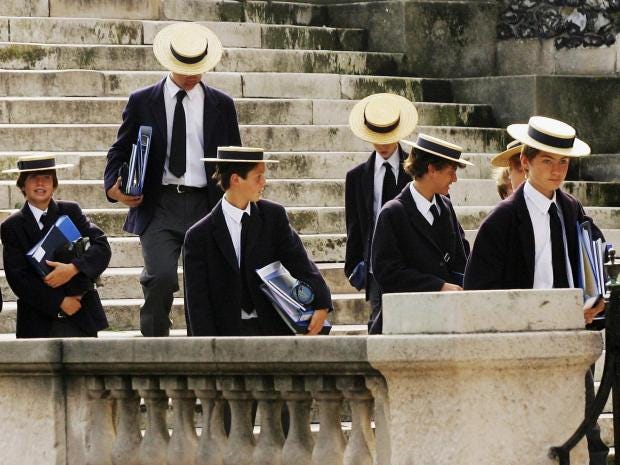
The stranglehold former public-school pupils have on the UK’s top jobs has laid bare in a hard-hitting report out today.
The study, by the Sutton Trust education charity, shows that virtually every key profession is dominated by privately educated pupils snaffling the senior jobs.
Their grip on power is most noticeable in the judiciary, where 74 per cent of leading judges (those in the High Court or Court of Appeal) were privately educated.
As a result of the research, an All-Party Parliamentary Group is to set up an inquiry into how to improve access for people from disadvantaged backgrounds to senior jobs.
The charity, which campaigns for equal access to education for all, demands tougher action be taken to help more bright state-school pupils to access leading positions in the professions.
Figures in the report also show that one in three MPs (32 per cent) was privately educated – as were half the members of the Conservative Cabinet. Even in Jeremy Corbyn’s Shadow Cabinet, 13 per cent of members went to private school. Nationally, the figure is just 7 per cent.
Today’s report, carried out by Dr Philip Kirby, goes on to show that 71 per cent of senior Army officers – two-star generals and above – went to private schools. Only 12 per cent attended comprehensives.
In medicine, 61 per cent of doctors were privately educated while 22 per cent went to selective state grammar schools and just 16 per cent to comprehensives. The list goes on – 48 per cent of civil servants were educated privately, 29 per cent went to selective grammar schools and 23 per cent to comprehensives.
The higher echelons of journalism are also dominated by the private sector, with 51 per cent educated in independent schools. And of those chief executives of FTSE 100 companies who were educated in the UK, 34 per cent were privately educated.
Nearly half the top actors – 42 per cent of Bafta Award winners – went to private schools, fuelling criticism made in the past month that the profession is becoming more elitist.
“Our research shows that your chances of reaching the top in so many areas of British life are so much better if you went to an independent school,” said Sir Peter Lampl, the chairman of the Sutton Trust. “As well as academic achievement, an independent education tends to develop the essential skills such as confidence, articulacy and teamwork, which are vital to career success.
“The key to improving social mobility at the top is to open all independent schools to all pupils based on merit, not money – as well as highly able students in state schools.”
Sir Peter advocates the adoption of the Open Access scheme, which the Sutton Trust tried out at the Belvedere Academy for girls, in Liverpool – where it paid the fees of all the girls who passed the entrance exam whose parents could not afford the fees.
The Department for Education said that 1.4 million more pupils were being taught in schools rated as “good” or “outstanding” by the education-standards watchdog, Ofsted, than in 2010.
“As The Independent Schools Guide has recognised, the state sector is increasingly matching the private sector in terms of academic attainment and learning environment,” a spokesman added.
[Source:- Ukeducationnews]


















